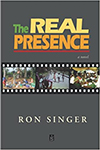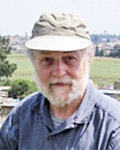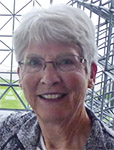Review — THE REAL PRESENCE: A NOVEL by Ron Singer (Nigeria)
 The Real Presence: A Novel
The Real Presence: A Novel
Ron Singer (Nigeria 1964–67)
Adelaide Books, May 2021
236 pages
$19.60 (paperback)
Reviewed by Lucinda Wingard (Nigeria 1966-68)
•

Ron Singer
Many of us RPCVs will agree that our lives were significantly altered by living and working in a foreign country. For author Ron Singer (Nigeria 1964-67) the years since Peace Corps have included serious attempts to understand and write about the evolution of his country-of-service.
The Real Presence opens with two Igbo characters each taking a chapter to describe for an indeterminate audience their lives before and up to independence in 1960. Addressing the reader in distinctly regional cadence, Lydia Ogochukwu and her much younger brother Jerry (Jeremiah) tell of village life, tribal customs, and their education from the 1930s to the 1950s. They attempt to correct the reader’s misconceptions about their birthplace and the region’s history.
The third character is Peace Corps Volunteer Bob Shepard (likely Singer’s alter ego), who begins his story in chapter three. It is 1963, and Bob makes friends with Jerry Ogochukwu at a university in the United States. The two are involved in a frat-boy prank, and to Bob’s great regret Jerry is expelled and deported in disgrace.
What could have been a disaster for Jerry and his family propels the impulsive boy to study at the University of Nsukka. He goes on to earn a series of impressive degrees in science and medicine. In a sprawling chapter, Jerry offers more bits of Igbo culture and his own version of the college prank.
Back in the States, Bob fritters away a couple of years enjoying the ’60s until the prospect of being drafted launches him into the Peace Corps. His characterization of “training” will make us RPCV readers laugh out loud. After training, Bob is assigned to teach in the western, Yoruba, region. Here, Singer takes the liberty of inserting one of his previously published poems and some anecdotes that riotously describe the PC experience. “I think I had more fun in Nigeria between 1964 and 1967 than in the rest of my life,” Bob crows, “. . . since we had a will to be naughty, we found a way.”
Come 1967, however, the story’s tone changes. The Nigerian characters struggle to survive the Biafran war. In part to hide his Igbo identity at University College Ibadan, Jerry marries a Yoruba woman, changes his given name to Felix and takes his wife’s family name, Olubunmi. Meanwhile, in Biafra, tribal membership did not always provide refuge. Lydia suffers violence at the hands of an Igbo, and her husband Harry is conscripted and loses a leg. At the end of the war, a major hospital in Enugu, where Lydia volunteers, is bombed with many casualties. In this scene of panic and anger, Lydia recounts how a Hausa officer in the Nigerian Army becomes a local hero.
At this point Singer inserts more backstory for Bob Shepard. (We can guess there is a large dollop of Singer’s own biography here.) A previously published short story of Singer’s becomes an entire chapter, evidently to describe the venality and cruelty erupting in poorly governed spaces.
The remaining chapters are devoted to the characters’ post-war lives up to 2011. Felix applies his studies of epidemiology to lead trans-African initiatives. He and his wife Angie work in public health, battling widespread distrust in government, miseducation, and religious scammers. “Angie and I firmly subscribe to the belief of people like Soyinka, Enahoro, and Tai Solarin that strengthening Nigeria’s multiple cultures is a key to constructive nationalism. It is only the politicians who turn ethnicity into “tribalism,” in order to advance their own selfish ends,” Felix writes, addressing us readers.
Lydia and Harry also manage to avoid most political interference as they become prosperous entrepreneurs – she in the fabric trade, he in transport. Over time, they adopt ten Biafran orphans temporarily sheltered in neighboring countries. Many grow up to become part of the successful Nigerian diaspora. Singer peppers these chapters with wonderful domestic scenes.
The presentation of this novel is unconventional, if not downright quirky. Singer’s final chapter is written in the style of a stage play script, where he assembles characters from many ethnic backgrounds at the University of Ibadan’s Event Centre to celebrate Felix’s retirement. The impressive academic CV of Dr. Felix Olubunmi-Ogochukwu is prominently displayed. Amidst the traditional speeches, jokes, ribald insults, and dancing, Felix/Jerry, and his American friend Bob Shepard veer into a discussion of politics. In the banter, we hear echoes of the same problems of national identity that John Campbell has raised recently in his very academic work, Nigeria and the Nation-State: Rethinking Diplomacy with the Postcolonial World.
Can Nigeria be a “real presence,” a verifiable nation among nations? Singer asks. His fictional Peace Corps Volunteer hopes that Nigeria’s nationhood will become more than a myth. His Nigerian friend, too aware of the forces of corruption and tribalism, remains skeptical.
•
 Reviewer Lucinda Wingard (Nigeria 22, 1966-68) has tried her hand at all manner of classroom teaching since her first job at Gombe Teachers College in Nigeria. Her students since then have included returning soldiers from Viet Nam, adult Vietnamese refugees, teenagers in American public schools, and first graders in an American School in Mexico. After “retirement” and while working in the Pierce County (Washington) Library System, she tried her hand at writing a novel that expressed some of her epiphanies while serving in Nigeria, The Turn-Around Bird. Most lately she is Book Editor for the Friends of Nigeria Newsletter.
Reviewer Lucinda Wingard (Nigeria 22, 1966-68) has tried her hand at all manner of classroom teaching since her first job at Gombe Teachers College in Nigeria. Her students since then have included returning soldiers from Viet Nam, adult Vietnamese refugees, teenagers in American public schools, and first graders in an American School in Mexico. After “retirement” and while working in the Pierce County (Washington) Library System, she tried her hand at writing a novel that expressed some of her epiphanies while serving in Nigeria, The Turn-Around Bird. Most lately she is Book Editor for the Friends of Nigeria Newsletter.
No comments yet.
Add your comment